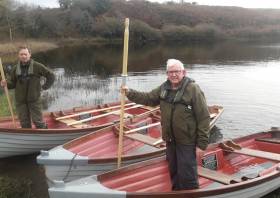Displaying items by tag: Shepperton Lakes
Shepperton Lakes in West Cork will now be eco-friendly following the introduction of measures to reduce the carbon footprint of anglers fishing the popular Shepperton (Shreelane) fishery.
Inland Fisheries Ireland (IFI) is introducing regulations which will only permit battery-powered engines on the lake from 1 January 2020.
As part of the eco-friendly measures, Inland Fisheries Ireland is removing its four petrol engines from use at Shepperton, between Leap and Skibbereen.
Anglers can now hire one of the recently refurbished boats and bring their own battery-powered engines.
This follows similar measures introduced at Ballinlough, north of Leap, which has operated successfully for a number of years.
The boat hire at Shepperton Lakes, including a one-day fishing permit for up to two anglers, will cost €30.
‘…a popular winter pike angling destination attracting local and visiting anglers to the area’
Sean Long, director of the South Western River Basin District, said: “This initiative was proposed by the local Inland Fisheries Ireland ‘Green Team’ as a quick and simple measure to reduce carbon emissions.
“We are pleased to offer this green solution to anglers at the lake while also maintaining the permit price once again this year.”
IFI’s Green Team comprises staff in various locations across the country and is part of the organisation’s efforts to refocus its philosophy in line with the critical nature of climate change and the impact it is having on the fisheries resource.
The Green Team works to create solutions which will help achieve an energy reduction target of 33% by 2020 and devise solutions which will support society in reducing its environmental footprint.
Shepperton/Shreelane Lakes in West Cork represent a popular winter pike angling destination attracting local and visiting anglers to the area.
As shore angling is not permitted, anglers are advised to book a boat locally from Mrs E Connolly via telephone 028 33328 in advance to avoid disappointment.





























































